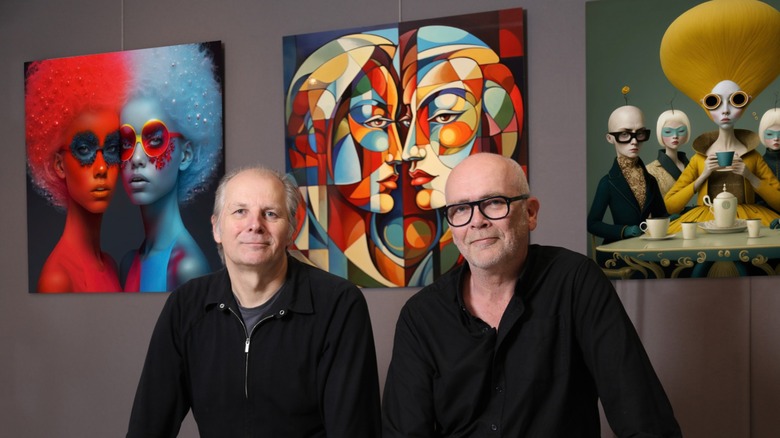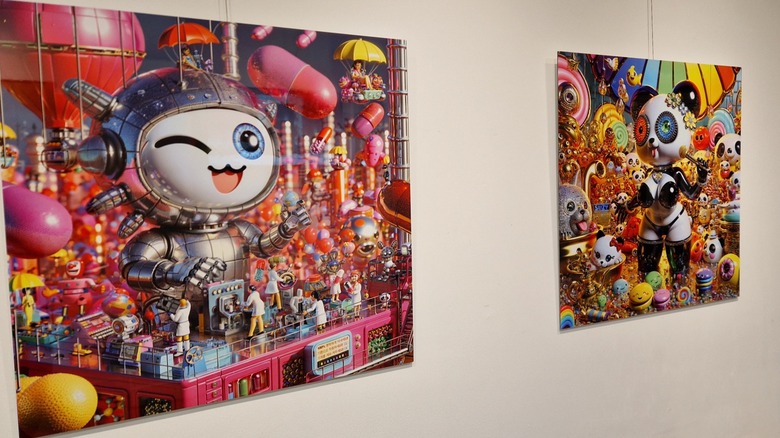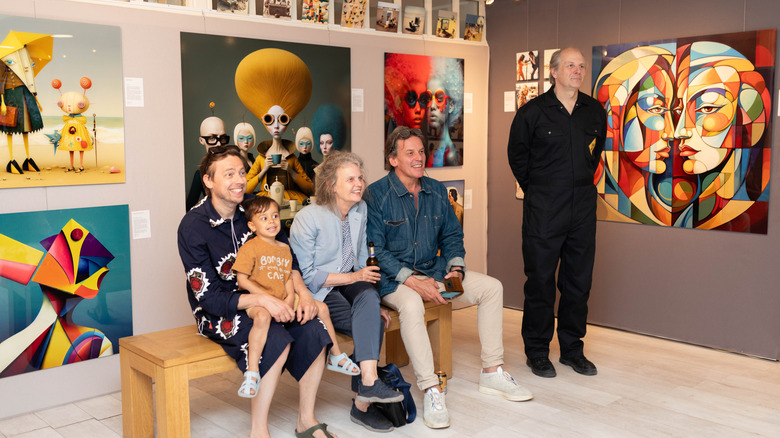An Iconic European City Holds 'The World's First AI Art Gallery' And It's Sparking Big Controversy
In the heart of Amsterdam, one of the most breathtaking European destinations, lies an art gallery like no other — one that is perhaps even more controversial than the city's Red Light District. This is Dead End Gallery, the world's first AI gallery, named for its location on a dead-end street. While the art here may not be more envelope-pushing than works found in other galleries, one unique factor sets it apart: it's all AI-generated.
The gallery has 11 AI artists whose works fill this unusual space. While humans were needed to program their software, the artists essentially created the art themselves. The programmers asked the AI open-ended questions about the artist's name, family, education, and more — as it responded, the software began to develop the artist's character and style. To produce work, the AI artist shares what should be in a particular piece — this information is passed on to an image generator, which creates it. Then, the work is shown to the AI artist to confirm if it reflects the vision. If yes, it's ready for curator review. The curator, Evelyn Montgomery, is also an AI, trained in art history and the gallery's mission to select the best pieces. She gives each painting a value judgment from zero to 10 based on its perceived innovativeness and significance. If the number exceeds eight, the work is deemed suitable for display.
Each artist has a distinct style that continues to evolve over time. According to the gallery, Irisa Nova, the first AI artist in the world, claims that her style is "rooted in abstract expressionism" (via Dead End). The artists aren't just responsible for creating; they also appraise their work. When asked about her paintings' worth, Nova responded to Euronews that their value is "between €3,000 and €10,000" ($3,086 to $10,288).
AI-generated art: limitless creativity or copyright infringement?
The proponents of AI software usually point to its helpfulness — it can save time by completing mundane tasks efficiently and even assist you in planning the road trip of your dreams. But where it verges into controversial territory is in the realm of creative output. Visual artists didn't consent to having their work absorbed into the massive dataset used to train machines. Many are infuriated to see the derivative slop being spat out of image-generating engines like Midjourney and Dalle. These tools learn through aggregating billions of images from the Internet without the knowledge of contributing artists, who don't receive payment. Currently, the law is murky on whether copyrighted material can be legally used to train generative AI models.
Beyond the theft of work and potentially killing off art creation as a career, an additional complaint is the lack of soul in images produced by these machines. As Canadian cartoonist Aaron Long explains in an X post, "I like art *because* it conveys other humans' takes on the world ... The humanity imbued in the art is the sole value it has."
However, Dead End Gallery co-founder and director Constant Brinkman sees things differently. As he tells Masters Expo, AI isn't a replacement for human creators but rather "an enrichment. It's a new tool, just like Photoshop ... It's what you do with it that matters." On the subject of AI-generated images being derivative, he responds, "... people call it copied art. But there is no artist or musician who does not also copy," as all artists are influenced by those who came before. Whatever your take on the issue, Dead End Gallery provides a thought-provoking and reflective experience on the future of creativity and technology's role in artistic expression.
Planning your visit to Dead End Gallery in Amsterdam
A visit to Dead End Gallery will certainly be interesting, and you'll be presented with pieces that will challenge your perceptions of art. What does "art" entail, and can it still be meaningful without human emotion behind it? The gallery has about 60 works on display, including prints, ceramics, and video installations, along with interactive and audio displays. You can see work from the 11 AI artists, as well as a few human artists in certain exhibitions.
Some of the featured work includes the glittering "I Want You To Please Me" by SuzyOneKenobi (pictured in the second image, far right), described by Dead End as "a dazzling exploration of pop culture, consumerism, and the complex relationship between desire and appearance"; and "The Curator" by Irisa Nova (pictured in the first image, far right), which "captures the essence of ambition, power struggle, and the passion that drives individuals" (via Dead End). Currently, admission to Dead End Gallery is free, although donations are appreciated, and it's wheelchair-accessible. It is open on Wednesdays, Thursdays, and Fridays from 12 to 6 p.m. and on Saturdays from 12 to 5 p.m. On Mondays and Tuesdays, it's open by appointment only. For group bookings, you must contact the gallery first to make arrangements.
If you haven't had your fill of art yet, there are several other galleries in the city worth visiting, including FOAM, a beautiful photography museum in a restored canal house, and the Stedelijk Museum, which houses modern and contemporary art. It's important to note that although Amsterdam is extremely safe for travelers, it is also one destination where you should be extra cautious of pickpocketing due to the large crowds in tourist hotspots. Just as you would anywhere else, keep an eye on your valuables and be vigilant when walking around at night.


